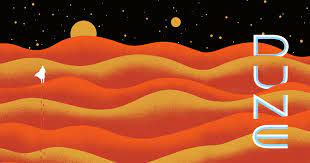Dune Book + Movie Review

February 25, 2022
Frank Herbert’s Dune, published in August 1965, remains as good as a book now as it was then. Dune follows the story of Paul, the heir to House Atreides, and his journey on Arrakis, the desert planet. Beginning on the planet Caladan, Duke Leto of Atreides receives an order from the Emperor to move from Caladan to Arrakis. The Emperor decided he didn’t like the Harkonnen’s (another House in the empire) growing power on Arrakis, which they had gained through a key element found in the desert: the spice. The spice is needed for interstellar travel because it gives the navigators the ability to essentially see into the future, and thus direct the course of the ship.
Herbert’s imaginative insights make the novel thrilling to read–from “ornithopters” to sand worms to body-shields (that can only be penetrated through slow attacks), Herbert’s sci-fi is unique and fun. But it’s not just the futuristic technology and giant aliens, it’s also how Herbert pictured politics in the distant future. There are several big political organizations within the Padishah Empire: The Bene Gesserit, who are mentally trained to detect the smallest movements, fine-tune their muscles and mind, and eugenically breed in order to find a messiah called the Kwisatch Haderach; the Guild, who has a monopoly on interstellar travel; the Sardaukar, ferocious soldiers trained by the emperor; and of course, the Fremen, natives of Arrakis. All of these people interact together to create a mind-boggling universe of complex social and political maneuvers. Every few pages, there is a new conflict or important choice for a character to make, which truly sucks you in.
I thought that it was very interesting to see the story from third-person point of view in which you can see what each character is thinking. It allowed me to understand each character’s actions–the evil (and fat–so much so that he has anti-gravity suspensors to help him walk) Baron Harkonnen, Lady Jessica, and of course, the traitor, Dr. Yueh. Herbert does a great job of explaining each character’s choices, yet also inducing worry into the reader about what’s going to happen (for example, Paul and Jessica running from the sand worm, shown below).
As for the movie, Denis Villaneuve directed a masterpiece. Timothée Chalamet stars as Paul, Zendaya as the Fremen girl Chani, and Rebecca Ferguson as Lady Jessica (Paul’s Bene Gesserit mother). The special effects were much better than the 1984 rendition, and I think the producers made the right choice to split Dune into two movies. The book is so filled with action that it would be difficult to fit everything into one movie; as it is, Dune is over two and a half hours. However, that time is well worth it; the movie is captivating.
One thing that is interesting about the movie is that it mainly focuses on a few characters, and it even leaves a few characters completely out. The main one that struck me was Dr. Yueh, who is never developed and seemingly randomly betrays the Atreides. The Baron Vladimir Harkonnen’s nephew and heir, Feyd-Rautha, along with the Baron’s Mentat, Piter, are never even shown in any major scenes. In fact, the Baron himself is rarely shown. Feyd-Rautha and the Baron are somewhat important to the plot in the next half of the book, so I wonder if Villaneuve will decide to incorporate them into part 2.
Overall, I would say that Dune has a different feel from Herbert’s book, but I don’t think that makes it bad–if the book was followed word for word, the movie would be very confusing and long. As it is, the movie is a good length, the plot is easy to follow, and the technology looked super cool. The book is a must-read for anyone remotely interested in sci-fi, and the movie is great even if you didn’t read the book (thought it is even better if you did). I personally am a sci-fi fan, so I have to give the book a 10/10 and the movie a 9/10–and I can’t wait for Dune 2.